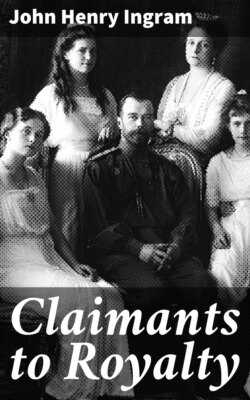Читать книгу Claimants to Royalty - John Henry Ingram - Страница 20
На сайте Литреса книга снята с продажи.
A.D. 676.
ОглавлениеWhen Clotaire the Third came to the French throne he was only five years old; consequently the affairs of the kingdom had to be entrusted to the guidance of a regent. The man selected to fill this post was Ebroin, and the choice appeared in every respect admirable. Ebroin was not only, apparently, fitted by birth and talent to sway the people, but he also possessed the qualification most desirable of all others for the time and clime in which he lived; that is to say, he was a valiant and experienced warrior.
Associated, however, with him in power, was Batilde, the queen dowager, a woman, according to all the priestly chroniclers, of great beauty and discretion, but doubtless much swayed by bigoted ecclesiastics. For some years the country enjoyed considerable prosperity: Batilde ruled with prudence and justice, and by keeping on good terms with the prelates has obtained no little historic fame; whilst Ebroin, having managed to quarrel with the Church, has left a reputation for all that is bad.
The queen dowager, either by compulsion or inclination, having resigned the cares of government, and taken refuge in the convent of Chelles, the chief minister, Ebroin, or Maire du Palais, as he was styled, was enabled to give full vent to all those evil qualities which circumstances had hitherto compelled him to conceal. Taking the entire power into his own hands, he killed and ill-treated, confiscated and exiled, with as much arrogance as a reigning king. In the year 668 the boy Clotaire died, aged about eighteen; and Ebroin, contrary to the wish of the nobles, placed Thierry, the younger brother of the deceased monarch, upon the throne, to the exclusion of the elder brother, Childerick, the next heir. He was induced to act thus in consequence of Thierry's youth, he being but eight, affording him a good opportunity of retaining the governing power in his own hands. In this act, however, he erred; for the nation, or at all events a powerful portion of it, revolted against his authority, overthrew him, and took both him and the prince Thierry prisoners. More merciful than was the wont in those days, the victors put neither of their prisoners to death, but contented themselves with shaving Ebroin's head—then deemed a terrible degradation—and confining him in a monastery, and with placing his youthful protégé under priestly surveillance.
In 973, Childerick the Second, and his wife and child, were assassinated by a gentleman whom he had had brutally beaten for remonstrating with him somewhat freely on the danger of an excessive imposition that he had wished to establish. Taking advantage of the confusion into which the country was thrown by this sudden event, Ebroin made his escape from the monastery in which he had been immured, and, aided by a large number of malcontents, set up the standard of revolt against Thierry the Third, who now, in consequence of his brother's death, became the legitimate king. Ebroin was joined by the Governor of Austrasia, by two deposed bishops, and by many other influential men, all of whom shared with him an intense hatred of Leger, Bishop of Autun, who now held the reins of power. In order to obtain more partisans amongst the people, Ebroin and his comrades brought forward a lad of about twelve or thirteen years of age, and asserted that he was a son of Clotaire the Third, who was believed to have died in 670, in his nineteenth year.
There was just a possibility of this boy having been Clotaire's son, although an illegitimate one, no proof of the deceased monarch's marriage ever having been adduced; and as illegitimacy was not in those days deemed a bar to the crown, the claim of little Clovis the Third, as Ebroin had him styled, may have been as valid as that of his competitors. Be that as it may, historians have also termed this youthful pretender, or rather tool of the conspirators, the false Clovis. The lad was attired in royal robes, and taught to affect a majesty of deportment towards all those who came to render him homage, whilst all those who refused to acknowledge him as king were maltreated, and their goods seized by his followers. His reign, however, was of short duration. Bishop Leger having been captured, deprived of sight, and thrown into prison, the great nobles and chieftains succumbed at once, and Ebroin found the whole power of the country in his own hands; he, therefore, deemed it better to make terms with Thierry, who willingly replaced him in his post of Maire du Palais, conditionally upon being left in nominal possession of the sovereignty.
Having thus attained his purpose, Ebroin had no longer any need of his puppet, and at once relinquished the imposture; but what afterwards became of the boy king history does not relate. As regards the originator of the scheme, his cruelties and tyranny increased daily, so that when in 683, or three or four years after the re-establishment of his power, he was assassinated by a noble named Bermenfroy, whose property he had seized, and whose life he had menaced, it must have been a real relief to his country. Through Ebroin's death it was that a way was opened for the family of Pepin, the founder of the Carlovingian race, to acquire the dignity of Maire du Palais, and subsequently the monarchy of France.
